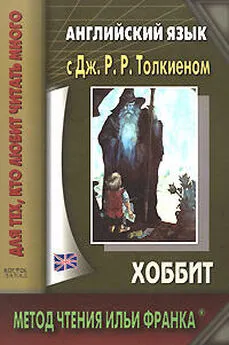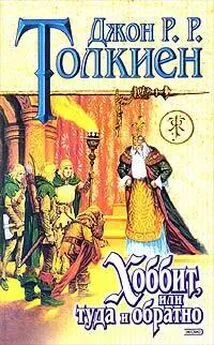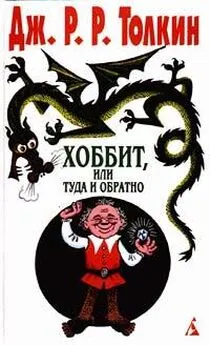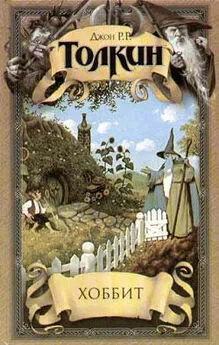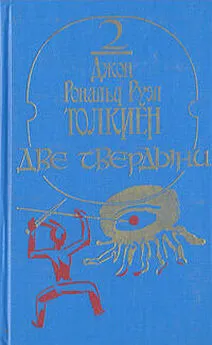Джон Толкиен - Английский язык с Дж. Р. Р. Толкиеном. Хоббит
- Название:Английский язык с Дж. Р. Р. Толкиеном. Хоббит
- Автор:
- Жанр:
- Издательство:АСТ, Восток-Запад
- Год:2008
- Город:Москва
- ISBN:978-5-17-048593-2, 978-5-478-00597-9
- Рейтинг:
- Избранное:Добавить в избранное
-
Отзывы:
-
Ваша оценка:
Джон Толкиен - Английский язык с Дж. Р. Р. Толкиеном. Хоббит краткое содержание
В книге предлагается произведение на английском языке Джона Р. Р. Толкиена «Хоббит», адаптированное (без упрощения текста оригинала) по методу Ильи Франка. Уникальность метода заключается в том, что запоминание слов и выражений происходит за счет их повторяемости, без заучивания и необходимости использовать словарь.
Пособие способствует эффективному освоению языка, может служить дополнением к учебной программе.
Предназначено для студентов, для изучающих английский язык самостоятельно, а также для всех интересующихся английской культурой.
Пособие подготовила Ольга Ламонова.
Английский язык с Дж. Р. Р. Толкиеном. Хоббит - читать онлайн бесплатно полную версию (весь текст целиком)
Интервал:
Закладка:
inheritance [ɪnˈherɪt (ǝ) ns] wealthy [ˈwelƟɪ] befriend [bɪˈfrend]
“It is in my mind to ask what share of their inheritance you would have paid to our kindred, had you found the hoard unguarded and us slain. ”
“A just question, ” replied Bard. “But you are not dead, and we are not robbers. Moreover the wealthy may have pity beyond right on the needy that befriended them when they were in want. And still my other claims remain unanswered. ”
“I will not parley, as I have said, with armed men at my gate. Nor at all with the people of the Elvenking, whom I remember with small kindness. In this debate they have no place. Begone now ere our arrows fly! And if you would speak with me again, first dismiss the elvish host to the woods where it belongs, and then return, laying down your arms before you approach the threshold. ”
“The Elvenking is my friend, and he has succoured the people of the Lake in their need, though they had no claim but friendship on him, ” answered Bard.
“We will give you time to repent your words. Gather your wisdom ere we return!”
Then he departed (затем он ушел) and went back to the camp (и вернулся в лагерь). Ere many hours were past (вскоре: «прежде чем прошло много часов»), the banner-bearers returned (вернулись знаменосцы; bearer: to bear + — er — несущий что-либо, носильщик, посыльный ), and trumpeters stood forth (вперед выступили трубачи; trumpeter: to trumpet (трубить) + —er — трубач, герольд ) and blew a blast (и затрубили в трубы; to blow (blew, blown) — дуть, гнать, выдувать; blast — поток ветра; звук духового инструмента ):
“In the name of Esgaroth and the Forest (от имени города Эсгарота и Леса), ” one cried (закричал один /из них/), “we speak unto Thorin Thrain’s son Oakenshield (мы говорим с Торином, сыном Трейна, Оукеншильдом), calling himself the King under the Mountain (называющего себя Королем под Горой), and we bid him consider well (мы предлагаем ему хорошенько обдумать) the claims that have been urged (те требования, что были выдвинуты; to urge — понуждать, подстрекать; доводить до сведения ), or be declared our foe (или /он/ будет объявлен нашим врагом). At the least (по меньшей мере) he shall deliver one twelfth portion of the treasure unto Bard (он должен передать одну двенадцатую часть сокровища Барду), as the dragon-slayer (как убийце дракона), and as the heir of Girion (и как наследнику Гириона). From that portion (из этой доли) Bard will himself contribute to the aid of Esgaroth (Бард сам пожертвует /средства/ на помощь Эсгароту; to contribute — жертвовать /деньги и т. п. /; делать вклад /в науку и т. п. /; способствовать ); but if Thorin would have the friendship (но, если Торин хочет /получить/ дружбу) and honour of the lands about (и почет в окружающих землях; honour — честь, благородство, уважение ), as his sires had of old (какими обладали его предки в старину; sire — зд. отец, прародитель, предок ), then he will give also somewhat of his own (тогда он даст, к тому же, что-то от себя лично: «из своего собственного») for the comfort of the men of the Lake (для поддержки людей с Озера; comfort — утешение, поддержка; комфорт, уют ). ”
Then Thorin seized a bow of horn (тогда Торин схватил лук из рога; horn — рог, отросток, выступ ) and shot an arrow at the speaker (и выпустил стрелу в глашатая; speaker — говорящий, оратор ). It smote into his shield (она ударилась о его щит; to smite (smote, smitten) — ударять (ся), бить (ся) ) and stuck there quivering (и застряла в нем, дрожа; to stick (stuck) — втыкать (ся), вонзать (ся), to quiver — дрожать мелкой дрожью, трепетать ).
bearer [ˈbeǝrǝ] trumpeter [ˈtrʌmpɪtǝ] contribute [kǝnˈtrɪbju: t] quiver [ˈkwɪvǝ]
Then he departed and went back to the camp. Ere many hours were past, the banner-bearers returned, and trumpeters stood forth and blew a blast:
“In the name of Esgaroth and the Forest, ” one cried, “we speak unto Thorin Thrain’s son Oakenshield, calling himself the King under the Mountain, and we bid him consider well the claims that have been urged, or be declared our foe. At the least he shall deliver one twelfth portion of the treasure unto Bard, as the dragon-slayer, and as the heir of Girion. From that portion Bard will himself contribute to the aid of Esgaroth; but if Thorin would have the friendship and honour of the lands about, as his sires had of old, then he will give also somewhat of his own for the comfort of the men of the Lake. ” Then Thorin seized a bow of horn and shot an arrow at the speaker. It smote into his shield and stuck there quivering.
”Since such is your answer (раз ответ твой таков), ” he called in return (закричал тот в ответ), “I declare the Mountain besieged (я объявляю Гору осажденной; siege, besiegement — осада, окружение; to besiege — осаждать, обложить /город, крепость/ ). You shall not depart from it (ты не покинешь ее; todepart — отбывать, уходить, уезжать, покидать ), until you call on your side (пока ты сам: «со своей стороны» не призовешь) for a truce and a parley (к перемирию и переговорам; truce—перемирие, передышка, временное соглашение ). We will bear no weapons against you (мы не применим против тебя оружия; to bear arms (weapons) against smb. — поднять оружие на кого-либо ), but we leave you to your gold (а оставим тебя с твоим золотом). You may eat that, if you will (ты можешь есть его, если хочешь)!”
With that the messengers departed swiftly (на этом гонцы быстро отбыли), and the dwarves were left to consider their case (и гномы были оставлены размышлять над /своим/ положением дел; case — случай; обстоятельство, положение дел ). So grim had Thorin become (Торин стал таким угрюмым), that even if they had wished (что, даже если бы они и захотели), the others would not have dared (остальные бы не осмелились) to find fault with him (придраться к нему; fault — недостаток, вина, ошибка; to find fault with smb., smth — придираться, ворчать, жаловаться на кого-либо, что-либо ); but indeed most of them (но, на самом-то деле, большинство из них) seemed to share his mind (казалось, разделяли его мысли) — except perhaps old fat Bombur and Fili and Kili (за исключением разве что/возможно старого толстого Бомбура да Фили и Кили). Bilbo, of course, disapproved (Бильбо, конечно, не одобрял; to approve — одобрять, считать правильным; to disapprove — не одобрять, осуждать ) of the whole turn of affairs (/весь/ поворот дел; whole — целый, полный, весь ). He had by now had more than enough of the Mountain (ему, к настоящему времени, Гора уже более чем надоела; to have enough of smth. — иметь /больше чем/ достаточно чего-либо, устать от чего-либо ), and being besieged inside it (и быть осажденным внутри нее) was not at all to his taste (было вовсе не по его вкусу = вовсе ему не по вкусу).
“The whole place still stinks of dragon (все это место все еще смердит драконом), ” he grumbled to himself (ворчал он сам себе), “and it makes me sick (и меня от этого тошнит). And cram is beginning simply to stick in my throat (да и бисквитник просто начал застревать в горле). ”
declare [dɪˈkleǝ] besiege [bɪˈsi: dʒ] truce [tru: s] throat [Ɵrǝʋt]
”Since such is your answer, ” he called in return, “I declare the Mountain besieged. You shall not depart from it, until you call on your side for a truce and a parley. We will bear no weapons against you, but we leave you to your gold. You may eat that, if you will!”
With that the messengers departed swiftly, and the dwarves were left to consider their case. So grim had Thorin become, that even if they had wished, the others would not have dared to find fault with him; but indeed most of them seemed to share his mind — except perhaps old fat Bombur and Fili and Kili. Bilbo, of course, disapproved of the whole turn of affairs. He had by now had more than enough of the Mountain, and being besieged inside it was not at all to his taste.
“The whole place still stinks of dragon, ” he grumbled to himself, “and it makes me sick. And cram is beginning simply to stick in my throat. ”
Chapter 16. A Thief in the Night
(Глава 16. Вор в ночи)
Now the days passed slowly and wearily (теперь дни проходили медленно и утомительно; weary — усталый, утомленный, изнывающий от скуки ). Many of the dwarves spent their time (многие из гномов проводили свое время) piling and ordering the treasure (складывая в кучи и приводя в порядок сокровища; to pile — складывать, сваливать в кучу, to order — приводить в порядок, располагать в определенном порядке ); and now Thorin spoke of the Arkenstone of Thrain (и теперь уже Торин заговорил об Аркенстоуне Трейна; to speak (spoke, spoken) ), and bade them eagerly to look for it (и просил их усерднее искать его; to bid (bade, bidden) ) in every corner (в каждом углу).
“For the Arkenstone of my father (так как Аркенстоун /принадлежавший/ моему отцу), ” he said, “is worth more than a river of gold in itself (стоит больше, чем река золота сама по себе), and to me it is beyond price (а для меня он — бесценен; beyond — за пределами, сверх ). That stone of all the treasure (тот камень из всех сокровищ) I name unto myself (я предназначаю для себя; to name — называть, назначать, упоминать ), and I will be avenged on anyone (и я отомщу: «я буду отомщен» любому; to avenge — мстить; to avenge oneself on smb. for smth. — отомстить кому-либо за что-либо ) who finds it and withholds it (кто найдет его и утаит его; to withhold — отказывать, удерживать, умалчивать ). ”
Читать дальшеИнтервал:
Закладка:
